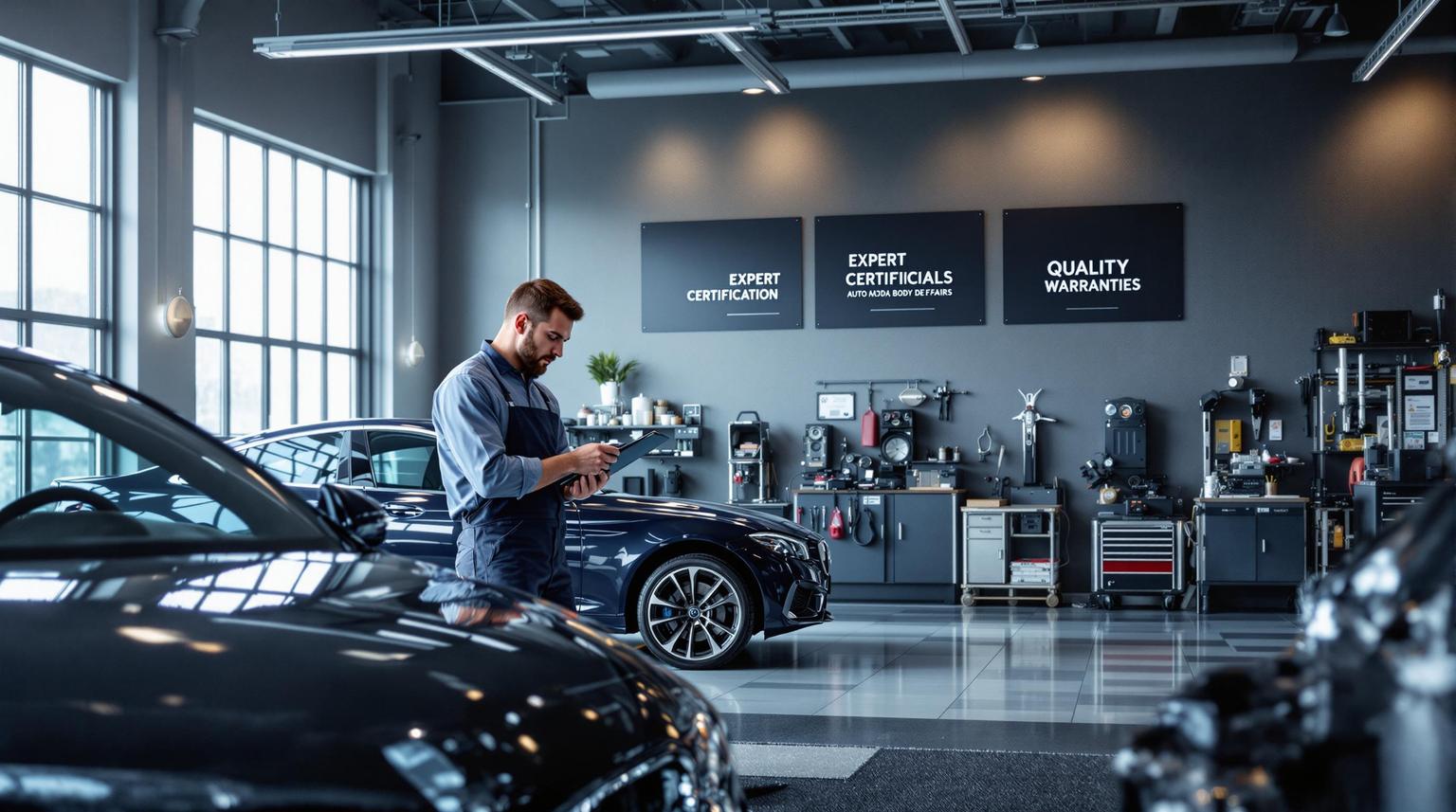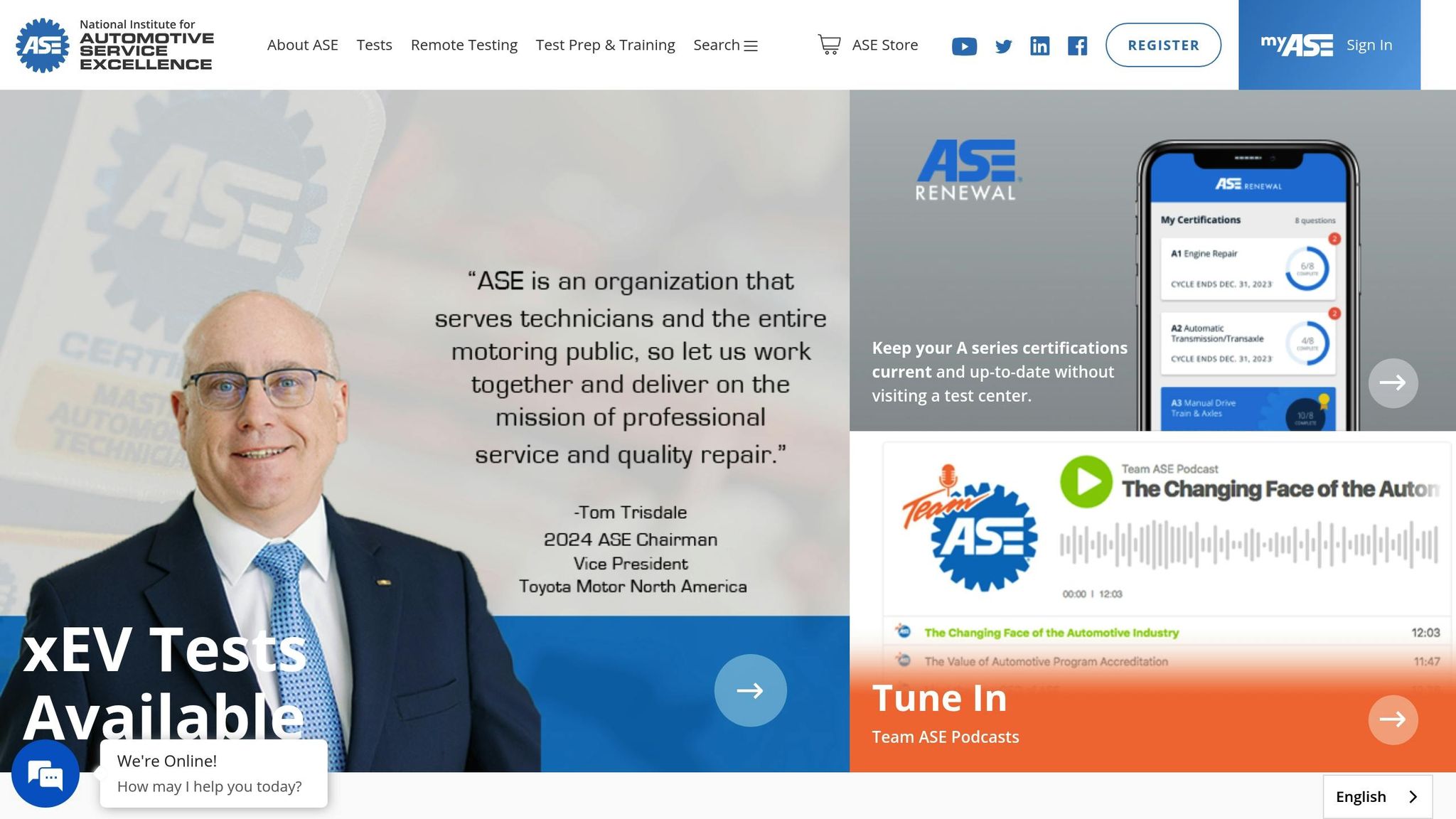February 12, 2025

Finding a reliable auto body repair shop is essential for maintaining the safety, appearance, and longevity of your vehicle. Here's how to make the right choice:
Quick Tip: Certified shops often deliver better results and provide warranties that back their work. Prioritize quality over the lowest price to protect your vehicle's value and safety.
ASE and I-CAR certifications play a key role in ensuring repair shops meet the technical demands of modern vehicles. ASE focuses on mechanical skills, while I-CAR specializes in collision repair expertise.

I-CAR offers an extensive training program with over 350 courses tailored to the needs of today’s vehicles. Below is a quick comparison of these certifications:
To confirm a repair shop’s certifications, follow these steps:
For vehicles requiring specialized repairs, additional manufacturer-specific certifications may be necessary. For instance, Jaguar’s aluminum welding standards highlight the importance of certifications in handling advanced materials. These credentials demonstrate expertise in specific repair techniques and materials.
While certifications validate technical skills, the next step is checking customer reviews to assess real-world performance.
When browsing reviews, focus on those that provide specific details about the shop's work rather than generic compliments. Here's what to look for:
"92% of consumers who use consumer online review sites say they made a purchase after visiting Yelp at least sometimes, frequently or almost always." - Podium
While certifications confirm a shop's technical qualifications, reviews and references provide insight into how well they perform on the job. When reaching out to references, ask specific questions such as:
Shops that consistently maintain ratings of 4.5 stars or higher often excel in both service quality and customer care [7].
The Better Business Bureau (BBB) can offer a deeper look into a shop's reliability and customer service, particularly through complaint resolution rates and response times. Here's what to prioritize:
Interestingly, a slightly lower BBB rating paired with detailed and transparent problem resolution can indicate greater accountability than a perfect score with no context.
For a well-rounded view, cross-check reviews on Google (which dominates 73% of review searches) and Yelp. Once you're confident in a shop's reputation, you can focus on evaluating their technical capabilities.
The tools and expertise a repair shop has directly affect the quality of the work. Here's what you need to check:
Today's vehicles require advanced tools that align with manufacturer standards. A well-prepared shop should have the following:
Make sure the shop has these tools and keeps records of their maintenance. If you're dealing with electric vehicles, verify they have insulated tools and follow high-voltage safety standards.
A shop's experience with your car's make and model is crucial. Use these methods to assess their expertise:
For vehicles with advanced driver assistance systems (ADAS), confirm the shop can perform ADAS calibration and validate repairs afterward.
Once you're confident in their technical abilities, you can move on to checking warranty options for added peace of mind.
Knowing what a warranty covers is key when choosing an auto body repair shop. Warranty options often depend on the shop's certification level and provide protection for your repairs.
Auto body shops usually offer various warranty options based on the type of repair and their certification. Here are some of the most common ones:
The shop's technical expertise often determines the type and length of warranty they can provide.
Before agreeing to any repair warranty, make sure to review these key factors:
"A proper warranty demonstrates confidence in repair quality - look for shops backing their work with written guarantees matching industry standards." - ASE Certification Board
Additionally, here are a few more points to check:
Pro Tip: Always review the warranty's fine print, especially around maintenance rules, exclusions, and the claims process. These details can save you a lot of trouble later.
Once you've confirmed a shop's technical expertise and warranty details, it's time to dig into the costs. This step helps you avoid surprises from hidden fees.
Reputable repair shops will give you a detailed, itemized estimate that breaks down parts, labor, and other fees. Here's what to check:
Most trusted repair shops will work directly with your insurance provider and offer flexible payment options. Knowing your choices can prevent unexpected out-of-pocket expenses.
Certified repair shops often include perks like:
For non-essential components, ask for a cost comparison between OEM and aftermarket parts to make an informed decision. This transparency ensures you’re balancing quality and cost effectively, alongside certifications like I-CAR Gold Class.
Choosing the right auto body shop comes down to three key factors: certified technicians, manufacturer-approved equipment, and strong warranties. Modern vehicles, especially those with advanced systems like ADAS or electric components, require shops with proven expertise backed by proper certifications.
Once you've reviewed certifications, customer reviews, equipment, and warranties, focus on shops that combine clear pricing with documented quality standards. Look for facilities that hold I-CAR Gold Class status, employ ASE-certified technicians, and participate in manufacturer-specific repair programs.
"ASE certification serves as a critical yardstick for measuring both individual technician competence and a shop's commitment to quality through investment in certified staff." - National Institute for Automotive Service Excellence
For the best results, prioritize shops that offer certified expertise, advanced tools, and comprehensive warranties. These elements ensure repairs meet safety requirements and provide lasting value. While cost is a factor, reputable shops justify their pricing with skilled staff, OEM-grade tools, and warranties that align with the repairs performed.
Opt for shops that deliver detailed repair documentation and upfront pricing rather than simply chasing the lowest quote. This approach increases the likelihood of getting repairs that uphold your vehicle’s safety, appearance, and durability.